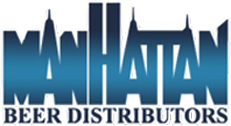
But the wholesaler, which does more than 50 percent of its volume in MillerCoors and Crown Imports products, has begun dedicating outsized attention elsewhere: to a craft portfolio that makes up just 5 percent of the company’s total sales.
The company, which has had a craft portfolio that is largely skewed toward bigger players like Boston Beer, F.X. Matt and North American Breweries, is looking to add to its ‘small craft’ stable. Robert Mitchell, Manhattan Beer’s general sales manager, told Brewbound.com that he expected the company to take on five new brands in the next year. While that might not seem like a huge expansion, the company prefers to look at the depth of manpower that the company can put behind a new part of the portfolio, rather than the variety of offerings.
“Our goal isn’t to be bigger, our goal is to be better,” Mitchell said when asked about having a smaller craft portfolio than some of Manhattan’s competitors. “Some of our competitors are all about delivery efficiency and the logistics of the business. If we can’t service a customer with the first thing they need, why would we be able to service them with the second thing they need?”
“We have more people, selling fewer brands and growing them more effectively,” he added.
The company currently employs approximately 650 individuals in sales and marketing. Those employees serve 23,000 accounts across 260 routes in 15 counties. That means manpower, and allows Mitchell to leverage a smaller craft portfolio with his retail customers because they know it will be there.
For example, Mitchell said, Manhattan Beer has no qualms about delivering a small five case order to one of its retail customers on a Saturday if they have to.
It’s a strategy that has helped the company earn the respect of not only the customers it delivers to but also the craft brands it distributes.
Mitchell believes that New York’s new franchise laws, which will allow small and mid-size breweries to terminate wholesale contracts, may have some brands – including those currently working with competing distributors – wondering if the grass is greener in Manhattan’s portfolio.
“I strongly anticipate with the new franchise law that we will add some new brands before the end of the year,” he said. “There are some brands actively pursuing us and we are also actively pursuing some brands.”
So what makes Manhattan different from its competitors on the franchise issue? They were in support of change, for one.
“We were advocates for it because the initial intent of the law was never to keep people hostage,” Mitchell said. “We have never kept a brand from moving. If someone is truly unhappy and feels that their brand would be better served elsewhere, we would always let them go and we don’t understand why others wouldn’t do the same.”
After all, Manhattan founder Simon Bergson relinquished the company’s InBev portfolio when it merged with Anheuser-Busch in 2008.

“If a large number of your brands want to leave, you need to take a look at your own business and ask yourself what you are doing with it that is making people so unhappy,” he said. “We sleep well at night because we think we do right by our partners.”
So what is Manhattan Beer doing so well with its craft brands that have other NY-distributed craft brewers curious? Again, it’s manpower.
“We have an army,” he said. “Our competition may have a lot of brands, but they are spread thin.”
Mitchell anticipates that plenty of new brands will look to enlist in the Manhattan Beer army — but that the company will “pick and choose” as it looks to grow the portfolio to about 25 brands over the next year.
“We look for strong, local, regional, and, obviously, ‘best in class’ brands,” he said. “If Kim Jordan comes knocking at your door you aren’t going to tell her that the inn is full.”
One such ‘best in class’ brand that Manhattan just bought distribution rights to (from American Beer Distributing) is Boulder, Colo.-based Avery Brewing Company.
“When you add a brand like Avery to our existing portfolio, it makes us that much stronger in those accounts that specifically look for the best of the best,” he said.
Avery joins a laundry list of well-performing craft brands for Manhattan. Mitchell said the company’s “small craft” portfolio (all craft brands excluding Boston Beer and F.X. Matt) has grown 40 percent while its overall portfolio is growing at 20 percent. Manhattan has already shipped nearly 1 million cases this year and will look to grow its total craft business by about 350,000 cases, moving a total of 1.7 million.